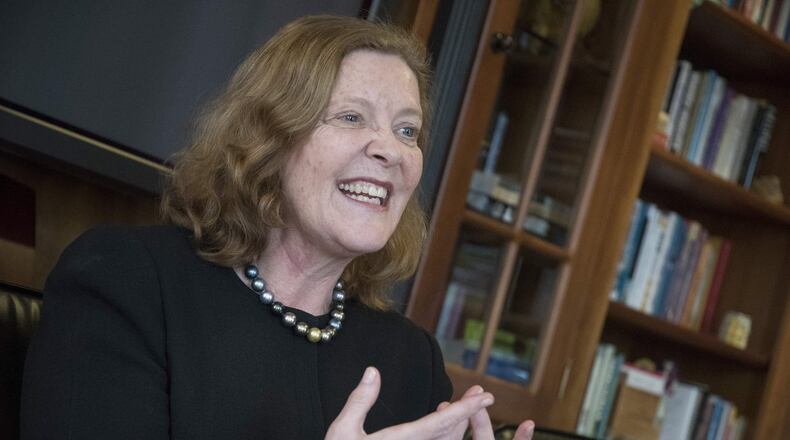Emory University will begin a search for a new leader after Claire Sterk announced plans to retire from her job as president in August.
Sterk, who took the job three years ago, said she wants to return to teaching and shared the news Wednesday with students, faculty and staff. Sterk, 62, suggested the demands of the job — Emory is the largest private university in the state — had taken a toll.
“Serving as president is a seven-day-a-week job,” she wrote. “I’m excited about teaching at Emory again, and I’m equally excited about having more time for friends, family and travel.”
Sterk, a Netherlands native who arrived at Emory in 1995 as an assistant professor, was prodded by friends to apply for the president’s job. She is the university’s first female president. Her annual salary is more than $1 million, according to the most recent university tax records.
> RELATED: Emory University selects first woman president
Many education leaders, such as Susanna Baxter, president of the Georgia Independent College Association, were surprised by Sterk’s announcement.
“I’m thrilled, though, she’s going to stay connected to the university and teach her passion, public health,” Baxter said.
Sterk’s academic work has focused on health disparities.
“I look forward to resuming my work on some of the most important issues of our time such as the opioid crisis, access to mental health and global child health (care),” Sterk wrote.
Many students were stunned by the announcement.
“I was kind of surprised,” said Dylan Johnson, 20, a second-year student majoring in math and economics. “She seemed to have a good grip on the job.”
“I thought she would stay longer,” said Laurel Merriman, 20, a third-year student majoring in economics and psychology. “She was well-liked.”
> RELATED: What's next in Emory University's growth plans?
Terry Hartle, senior vice president of the American Council on Education, noted the average tenure is six years for a university president. He said the job can be “draining.”
“Academics get the job and do it for a few years and realize they want to go back into academics,” he said.
Leading Emory University is one of the most complex and largest jobs in higher education in America. The university is considered one of the top medical research institutions in the nation. Its health care system has more than 21,000 employees. Emory University has about 15,000 students and is often ranked as the top academic institution in Georgia.
Sterk's departure comes as Emory works on several major projects. Emory broke ground Tuesday on a $469 million cancer care facility that will stretch across more than 3 acres of Midtown Atlanta. The school is in the midst of a multibillion-dollar capital master plan. The largest project is a $1 billion medical complex in Brookhaven that would include a hospital, hotel, apartments and miles of walking trails and paths.
Baxter, Hartle and others interviewed Wednesday believe Emory will have many highly qualified job applicants. One potential candidate, Provost Dwight McBride, is out of the running. He’s leaving early next year to become president of The New School, a century-old, liberal arts college based in New York City.
Higher education leaders believe Emory’s next president must be a strong fundraiser with administrative experience and a gifted academic, particularly in research.
Some praised Sterk for maintaining Emory’s strong academic reputation while forging stronger ties with the community. During her tenure, Emory annexed into the city of Atlanta, which it thought was critical to create better transportation options for students and employees.
Sterk has focused on improving diversity and inclusiveness at Emory. The university has hired more women in leadership positions and recruited more military veterans. The university has been criticized for its handling of issues such as three instances in the past year where law school faculty used a word often said to demean African Americans, and mock eviction notices posted on campus earlier this year denouncing the Israeli government.
Students said they hope Emory’s next president will better address such situations. Some mentioned they hope the next president looks at lowering costs for some student services. Merriman, an economics and psychology major, said she’d like to see Emory offer more counseling for students.
“We don’t always necessarily promote the things for students to excel,” she said.
About the Author
The Latest
Featured



